最新人教新目标英语七年级下册unit 2《What time do you go to school》the first period课件
新人教版七年级英语下册教案— Unit 2 What time do you go to school
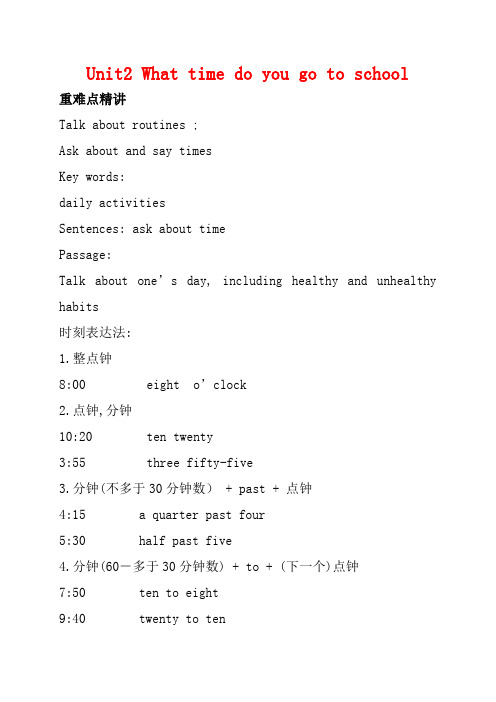
Unit2 What time do you go to school重难点精讲Talk about routines ;Ask about and say timesKey words:daily activitiesSentences: ask about timePassage:Talk about one’s day, including healthy and unhealthy habits时刻表达法:1.整点钟8:00 eight o’clock2.点钟,分钟10:20 ten twenty3:55 three fifty-five3.分钟(不多于30分钟数) + past + 点钟4:15 a quarter past four5:30 half past five4.分钟(60-多于30分钟数) + to + (下一个)点钟7:50 ten to eight9:40 twenty to ten一个小时an hour半个小时half an hour一刻钟a quarterget upbrush teethtake a showerget dressedeat breakfastgo to schooldaily routinesgo to beddo homeworkTalk about time1. --What time is it? \What’s the time?--It’s eight thirty.2. --What time do you usually get up?--I usually get up at six thirty.3. --What time does she/he go to school? --She/He goes to school at five thirty.4. --When do your friends eat dinner?--They usually eat dinner in the evening.重要词组get upeither… or…重点句型It’s good for sb. to do sth.Grammar副词 always, usually, never 的用法介词 in, on, at, for 与时间搭配的区别题一:I often get d__________ at eight.Every morning I play sports, and then I take a s__________. What do you u_________ do on Sunday?I usually eat breakfast q________.She __________(锻炼)every morning.I play football at a _________(一刻钟) past three in the afternoon.What’s your father’s _________(工作)?题二:-______ do you go to school?- Often ______ 7:30 a.m.A. What time; onB. What time; atC. What; inD. When; inI go to ______ work after _______ breakfast every day. A. /; the B. the;/C. /;/D. the; a题三:Our school ________ at nine o’clock every morning.A. goesB. takesC. startsD. getsMy mother usually _______ at 5:30 in the afternoon.A. get homeB. get homeC. get to homeD. gets home题四:We just need one of you for the game. ______ you ______ your brother can join us.A. Both; andB. Neither; norC. Either; orD. Not only; but also题五:– Do you know ________?–Sorry, I don’t have a watch.A. whose watch this isB. whose watch is thisC. what time it isD. what time is it题六:你父亲是7点钟去上班吗?_________ your father __________ at seven?你通常几点睡觉?_____________ do you usually __________?请写信告诉我你学校的情况。
(完整版)新版新目标英语七年级下册unit2知识点总结

Unit 2 What time do you go to school?Section A1.get dressed 穿衣服表示穿的动作be dressed in+颜色/衣服穿着表示穿的状态2.brush one’s teeth 刷牙brush n 刷子brushes v 刷take a shower=have a shower 洗澡3.(1)what time 几点问具体时间,一般回答要具体到小时(2)when对时间提问,询问日期、月份、年份,回答既可是具体的时间,也可是不具体的时间,in the morning,last year,in 1998 等范围大的时间,When does he take a shower?他什么时候洗澡?He takes a shower in the morning. 他在早上洗澡。
I take a shower at 6 o’clock in the morning.我早上六点洗澡。
4.at in on(1)at + 具体时间点,在几点(几分)固定搭配at 7:00 at night at noon(2)in + 时间段(周,年份,月份,季节,早中晚)in 1942 in the morning in May(3)on + 星期/日期/节日或具体某一天的早中晚on a cold winter night on Children’s Day on Monday5. always usually often sometimes 频度副词,常用于动词be 助动词或情态动词之后,行为动词之前。
(1)always(100%) 总是、永远,表动作重复,状态继续,中间没间断,通常修饰动词的一般时态。
若修饰进行时,则有“老是”,“再三地”的意思,带有厌烦、不满、赞美等感情色彩。
(2)usually(80%)通常,着重表示已习惯的动作。
反义词unusually(3)often(60%)时常、经常,表示常常这样,但不总是这样,反义词seldom(4)sometimes(30%)有时、不时,说明的是偶尔发生的事情或情况。
人教新目标七年级下册Unit2 What time do you go to school Sect

T eaching PlanUnit2What time do you go to school?SectionA1a-2dⅠ.Language goals:1.V ocabulary:dress,up,brush,tooth,shower,usually,early,station,funny,exercise2.Phrases:g e t up,dr essed up,g e t dressed,brush the teeth,take a shower,radiostation,eat breakfast3.Sentences and structures:-What time is it?-It’s…T eaching goals: T eaching important points:-What time do you usually…?-I usually….-What time d o es h e/sh e usually…?-He/She usually..(s/es)….II.Ability goals:1.T alk a bo u t routines;Ask a bo u t and say times.2.Improve the abilities of listening,speaking.3.Learn t o use the phrases and sentences of this part.III.Emotion goals:T o understand the importance of the time and making full use of time1.New words and expressions in this part.2.The routinesT eachingdifficult points:S tudents can talk a bo u t their routinesT eaching approaches: Learning T ask-based Language T eaching speaking,listeningapproaches:T eaching procedures:T eaching contents and the teacher’s activities S tudents’activitiessS tep One: Greeting1. Greet the students warmly ..2. Enjoy a son g abo u t the clock. S tep Two: Talk about time1. T: What time is it? S: It ’s eight o ’clock. (Ask several students a bo u t time.)2. Ask one student to be a clock and show us the time. S tep Three: Presentation1. -What do you usually do at 6:30? S: I usually …at …-What do I usually do at 6:30? Listen and guess. - Brush the t eethMotivate students t o g et into the class quickly.Use the new phrases to mak e sentences.2. Guess my morningListen and guess what I usually do in the morning.(get up, go t o work, g e t dressed, brush the teeth, take a shower).3. R ead the phrases loudly and r e me mber them. S tep Four: PairworkA: What time do you usually…?B: I us ually… at….Work in pairs and gr oups S tep Five: Groupworkt o practice the dialogueA: What time does he/she usually …?B: He/She usually –(s/es) up at…. S tep Six: Oral English1. I talk about my morning and then I ask students to talk about their own morning.I g e t up at 6:30. I brush my teeth at 6:35. I take a shower at 6:40. I eat breakfast at 7:00. I g e t dressed at 7:20. I go to work at 7:30. 2. Ask student to talk about Mrs W ang ’morning. Mrs Wang gets up at 6:30. She brushes the teeth at 6:35. She takes a shower at 6:40.She eats breakfast at 7:00. She getsdressed at 7:20. She g o es t o work at 7:30. S tep Seven: Listening practice1. Listen and mat ch the times with the actions. Draw lines from the clocks t o the pictures. (1b)2. Listen to the conversation. Complete the sentences.(2a)3. Listen again. Complete this shower schedule for Jim’s family.(2b)S tep Eight: ConversationS tudents can use the important sentence pattern to talk a b o u t their own morning and other ’s morningListen and fill in the blanks1R ead the conversation in2d loudly and quickly,then fill in the Discussion blanks.2.Role-playAsk two students t o imitate2d t o have an interview.Then show us it.Step Nine:Homework1.Make a survey with the drill“What time do e s your father/ mother g e t up/take a shower…?2.Design(设计)your ideal(理想的)day!Proverbs:•Time is life.R ead the conversation and give students the performanceR emember the importance of the time•Time is money.•All time is no time when it is past.•Every second counts.Unit2What time do you go to school?1.--What time do you usually ge t up?--I g e t up at6:30.2.–What time d o e s he/sh e usually g e t up/…?--He/She gets up at6:30.gets dr essedeats breakfastg o e s to workbrushes the t eeth。
人教版新目标英语七年级下册《Unit 2 What time do you go to school

人教版新目标英语七年级下册《Unit 2 What time do you go to school》优质教学设计2一. 教材分析人教版新目标英语七年级下册《Unit 2 What time do you go to school》主要介绍了日常生活中的时间安排,包括起床、吃早餐、上学、放学、做作业、娱乐等活动。
本节课主要让学生学会询问和回答别人日常活动的时间,并能够用英语描述自己的时间安排。
教材内容贴近学生生活,有利于激发学生学习兴趣,提高学生英语表达能力。
二. 学情分析七年级的学生已经掌握了基本的英语语法和词汇,具备一定的听说读写能力。
但部分学生对英语学习仍存在恐惧心理,缺乏自信心。
此外,学生在生活中对时间的认识和安排各有不同,需要教师引导学生逐步养成良好的时间管理习惯。
三. 教学目标1.知识目标:学生能够掌握日常活动词汇,如sleep, wake up, get up,go to school等;学会用What time do you go to school?询问别人日常活动的时间,并能用英语描述自己的时间安排。
2.能力目标:学生能够听懂、会说、会读、会写日常活动相关的句子,提高英语表达能力;学会用英语询问和回答别人日常活动的时间。
3.情感目标:培养学生珍惜时间、合理安排时间的意识,养成良好的时间管理习惯。
四. 教学重难点1.重点:学生能够运用所学词汇和句型询问和回答别人日常活动的时间。
2.难点:学生能够用英语描述自己的一日生活,并在实际情景中灵活运用所学知识。
五. 教学方法1.任务型教学法:通过设定各种实际情景,让学生在完成任务的过程中运用所学知识,提高语言实际运用能力。
2.情境教学法:创设生活情境,让学生在真实的环境中感受和体验英语,激发学习兴趣。
3.激励性评价:注重鼓励学生,提高学生自信心,激发学生学习积极性。
六. 教学准备1.教材:人教版新目标英语七年级下册《Unit 2 What time do you go to school》。
七年级英语下册Unit2Whattimedoyougotoschool教案新版人教新目标版
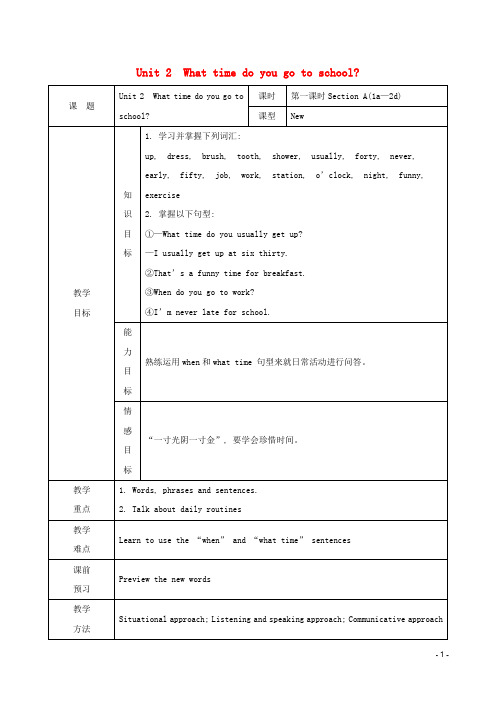
②When does Scott go to work?
③He always goes to work at seven o’clock.
能力目标
1.掌握What time及When特殊疑问句及其答语。
2.熟练使用频度副词
Summarize how to use what time to ask about their daily activities.
培养学生探究、归纳总结能力。
续表
教学环节
教师活动
学生活动
备课札记
Step 8
Consolidation
教师设置巩固检测练习:
Ⅰ.用所给词的适当形式填空
1. What time do you getdressed(dress) every morning?
2. Ss talk about themselves in pairs.
通过利用“信息差”进行口语结对活动,在交流信息过程中,进行真实的交际问答活动。
Step 6
Role-play (2d)
1. Let Ss read the conversation of 2d and answer the questions below.
2. Play the tape of2a.
3. Let Ss look at the chart of 2b carefully.
4. Play the tape of 2b.
1. Ss read the sentences in the box in2abefore listening to the tapபைடு நூலகம்.
七年级英语下册Unit2Whattimedoyougotoschool说课稿新版人教新目标版

Unit 2 What time do you go to school一、说教材(一)教材分析:1、教材简析:人教版《新目标英语》七年级下册第二单元中心话题是通过对日常生活作息时间的谈论,让学生学会时间的表达法.主要学习用what time和when来引导的特殊疑问句询问时间的标准用法,还有不同时间段的表达法以及表示频率副词的学习。
通过本单元的学习使学生学会不同时间段的表达法,学会用频率副词谈论自己日常生活习惯.通过对不同时间段的系统学习和理解,学会调整和安排自己的学习和课外活动时间,能够运用所学知识对某一活动进行合理的安排;使学生深刻理解时间的重要性,学会珍惜时间,并逐步养成良好的作息习惯.2、教学目标(知识目标、能力目标、德育目标)知识与能力:(1)掌握Section A 1a—2c和Section B 2a出现的单词和短语:time, what time, usually, get up, go to school, go home, shower, take a shower, do one’s homework, go to bed(2)掌握运用重点句型:What time do you usually get up; I usually get up at six o’clock/six thirty。
What time does she/he usually get up; She/He usually gets up at six o'clock/six thirty.过程与方法:通过运用英语正确表达时间和谈论日常作息安排,提高学生的综合语言运用能力。
情感、态度与价值观:通过学习,使学生充分认识时间的重要性,让学生养成良好的作息习惯和培养学生珍惜时间的优良品质。
确立教学目标的依据:以《英语课程标准》为理论依据,通过听、说、读、写四项基本语言技能的训练,激发学生的学习兴趣,帮助学生树立自信心和建立学习成就感,使他们在语言学习实践过程中发展综合运用能力.此外,根据教学内容,把培养学生的情感融化到日常教学当中。
人教版新目标英语七年级下册《Unit 2 What time do you go to school

人教版新目标英语七年级下册《Unit 2 What time do you go to school》教学设计3一. 教材分析人教版新目标英语七年级下册《Unit 2 What time do you go to school》主要围绕着日常生活中的时间安排展开。
本节课通过学习不同的时间表达方式,使学生能够灵活运用英语询问和描述日常作息时间。
教材内容丰富,包括对话、词汇、语法及任务型活动等,旨在培养学生的听说读写技能,提高他们的语言运用能力。
二. 学情分析七年级的学生已经掌握了基本的英语语法和词汇,具备一定的听说读写能力。
他们对新知识充满好奇心,善于模仿和交流。
但同时,部分学生可能对时间表达方式的掌握还不够熟练,需要教师的引导和练习。
三. 教学目标1.知识目标:学生能够掌握日常时间表达方式,如“What time do yougo to school?”、“I go to school at 7:00.”等;2.能力目标:学生能够在实际情境中运用英语询问和描述时间;3.情感目标:培养学生珍惜时间、合理安排作息的良好习惯。
四. 教学重难点1.重点:学生能够正确使用时间表达方式进行问答;2.难点:学生能够在实际情境中灵活运用时间表达方式。
五. 教学方法1.情境教学法:通过设定真实的生活情境,让学生在实际交流中学会运用时间表达方式;2.任务型教学法:设计各种任务活动,让学生在完成任务的过程中提高语言运用能力;3.互动式教学法:引导学生积极参与课堂互动,增强学生的自信心和合作精神。
六. 教学准备1.准备教材、课件和教学资源;2.设计相关任务活动和练习题;3.准备时间表、闹钟等教具。
七. 教学过程1.导入(5分钟)利用多媒体展示不同的时间场景,如早晨起床、上学、放学等,引导学生用英语描述这些场景。
2.呈现(10分钟)教师展示教材中的对话,让学生边听边跟读,掌握日常时间表达方式。
同时,教授时间词汇如“morning”、“afternoon”、“evening”等。
七年级英语下册《Unit2 What time do you go to school Period 2》人教新目标版

七年级下册Unit2 What time do you go to school? 导学案 Period2【学习目标】1.知识目标:巩固表示日常作息的词汇。
2.技能目标:熟练表达自己一天作息情况。
3.情感目标:培养学生良好的生活习惯。
【学习重难点】熟练掌握表达一天作息的句型。
【学习过程】:一、自主复习1.试翻译下列句子。
你每天什么时候起床?______________________________________________我每天六点穿衣。
___________________________________________________她每天六点十分刷牙。
______________________________________________他总是七点半吃早饭。
______________________________________________他每天晚上八点洗澡。
______________________________________________二、对话练习听2d录音跟读模仿。
Pair work 两人展示:Interviewer: Scott has an interesting job. He works at a radio station.Scott, what time is you r radio show?Scott: From twelve’s o’clock at night to six o’clock in the morning. Interviewer: What time do you usually get up?Scott: At eight thirty at night. Then I eat breakfast at nine. Interviewer: That’s funny time for breakfast.Scott: Yeah. After that, I usually exercise at about ten twenty. Interviewer: When do you go to work?Scot t: At eleven o’clock, so I’m never late for work.Group work: 小组合作:调查本组内成员信息,展示调查结果。
新人教版七年级英语下册《Unit 2 What time do you go to school?》教案
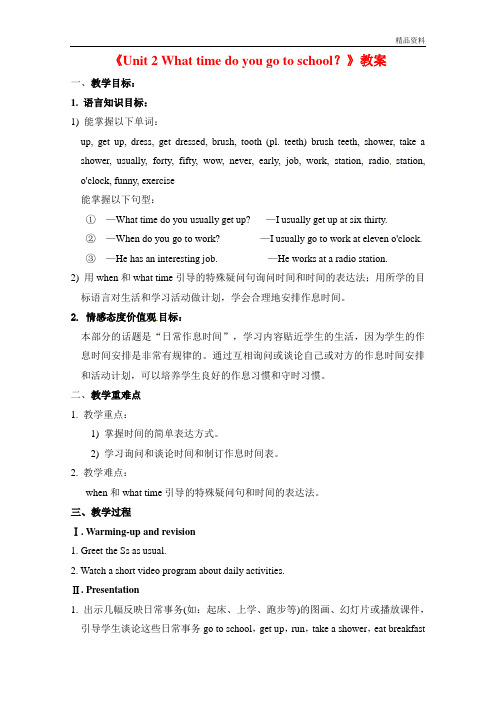
《Unit 2 What time do you go to school?》教案一、教学目标:1. 语言知识目标:1) 能掌握以下单词:up, get up, dress, get dressed, brush, tooth (pl. teeth) brush teeth, shower, take a shower, usually, forty, fifty, wow, never, early, job, work, station, radio station, o'clock, funny, exercise能掌握以下句型:①—What time do you usually get up? —I usually get up at six thirty.②—When do you go to work? —I usually go to work at eleven o'clock.③—He has an interesting job. —He works at a radio station.2) 用when和what time引导的特殊疑问句询问时间和时间的表达法;用所学的目标语言对生活和学习活动做计划,学会合理地安排作息时间。
2. 情感态度价值观目标:本部分的话题是“日常作息时间”,学习内容贴近学生的生活,因为学生的作息时间安排是非常有规律的。
通过互相询问或谈论自己或对方的作息时间安排和活动计划,可以培养学生良好的作息习惯和守时习惯。
二、教学重难点1. 教学重点:1) 掌握时间的简单表达方式。
2) 学习询问和谈论时间和制订作息时间表。
2. 教学难点:when和what time引导的特殊疑问句和时间的表达法。
三、教学过程Ⅰ. Warming-up and revision1. Greet the Ss as usual.2. Watch a short video program about daily activities.Ⅱ. Presentation1. 出示几幅反映日常事务(如:起床、上学、跑步等)的图画、幻灯片或播放课件,引导学生谈论这些日常事务go to school,get up,run,take a shower,eat breakfast等,学习有关的动词短语。
人教版新目标版七年级英语下册 Unit 2 What time do you go to school教案
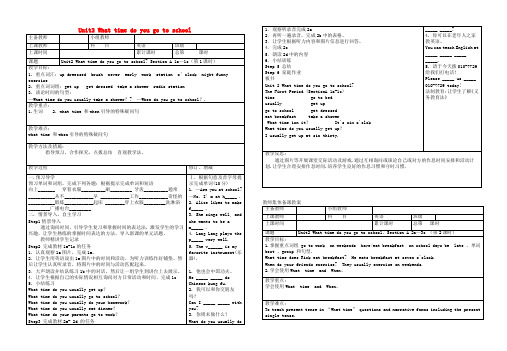
7. 3a: Use“always”,”usually”, or“never”to make sentences.
8. 3b :Let students write about something they do.
Step3 3c :1.make an interview 2. write a short passage
What time do you usually eat dinner?
What time do your parents go to work?
Step3 完成教材2a- 2d 的任务
1.观察听录音完成2a
2.再听一遍录音,完成2b中的表格。
3.让学生根据听力内容和图片信息进行回答。
4.完成2c
5.朗读2d中的内容
2. 重点词词组:get up get dressed take a shower radio station
3. 谈论时间的句型:
—Whattimedo youusuallytake a shower?? —When do you go to school?.
教学重点:
1.生词 2. what time 和when引导的特殊疑问句
1. 他也会中国功夫。
He__________do Chinese kung fu.
2. 我可以和你交朋友吗?
Can I__________with you?
3. 你周末做什么?
What do you usually do__________?
4. 你可以在老年人之家教英语。
You can teach English at____________________.
人教版新目标七年级英语下册Unit2Whattimedoyougotoschool语法篇试题含答案

人教版新目标七年级英语下册Unit2Whattimedoyougotoschool语法篇试题学生通过本讲学习,能够掌握本单元的重点语法,并在综合能力上有一定的拓展。
一、what time与when1.what time翻译为“几点”问的是具体的时间,一般回答要具体到小时。
What time do you go to school?你什么时候/几点上学?I go to school at half past seven o’clock.我七点半去上学。
回答具体到点钟,且注意在几点前边的介词用at。
2.when也是对时间的提问,但与what time的区别是:用when提问,回答既可以是具体的时间,也可以是不具体的时间,如:in the morning,last year,in 1998等范围大的时间,例如:When does he take a shower?他什么时候洗澡?He takes a shower in the morning.他在早上洗澡。
也可用具体时间:I take a shower at 6 o’clock in the morning.我早上六点洗澡。
3. 问对方时间点只能用what time,如What time is it?二、频率副词的使用用法几个频率副词的用法★alwaysalways 意为“总是”,与进行时态连用时,可以表示赞扬,也可以表示讨厌等感情色彩。
e.g.(1)I shall always remember my first day at school. 我将永远记住我上学的第一天。
(2)He is always smoking. 他总是抽烟。
★usuallyusually可以指通常的动作,但是侧重已经形成的习惯,它是从已经形成的角度来说明动作。
e.g.(1)I usually do some shopping with my parents on Sundays. 我经常在星期天和我的父母一起去买东西。
人教版新目标英语七年级下册《Unit 2 What time do you go to school

人教版新目标英语七年级下册《Unit 2 What time do you go to school》优秀教学设计2一. 教材分析人教版新目标英语七年级下册《Unit 2 What time do you go to school》主要讲述了日常生活中关于时间的基本表达方式。
通过本单元的学习,学生能够掌握一般现在时态的疑问句和回答,以及询问和描述日常活动的时间。
教材以真实的生活场景为背景,让学生在实际语境中学习、练习和应用英语,提高他们的语言运用能力。
二. 学情分析七年级的学生已经掌握了基本的英语语法知识和一定数量的词汇,具备一定的听、说、读、写能力。
但部分学生对英语学习的兴趣不足,学习积极性有待提高。
此外,学生之间在学习上的差距较大,有的学生英语基础较薄弱,需要更多的关注和辅导。
三. 教学目标1.知识目标:学生能够掌握一般现在时态的疑问句和回答,正确运用动词短语描述日常活动的时间。
2.能力目标:学生能够在实际语境中听、说、读、写关于时间的表达,提高语言运用能力。
3.情感目标:激发学生学习英语的兴趣,培养他们积极向上的学习态度,增强自信心。
四. 教学重难点1.重点:学生能够运用一般现在时态的疑问句和回答,描述日常活动的时间。
2.难点:学生能够在实际语境中正确运用动词短语,灵活表达关于时间的句子。
五. 教学方法1.情境教学法:通过设定真实的生活场景,让学生在实际语境中学习、练习和应用英语。
2.交际法:鼓励学生积极参与课堂交流,提高他们的听说能力。
3.任务型教学法:通过完成具体任务,让学生在实践中掌握语言知识,提高语言运用能力。
六. 教学准备1.教师准备:备好相关教学材料,如PPT、图片、实物等。
2.学生准备:预习本节课的内容,了解一般现在时态的疑问句和回答。
七. 教学过程1.导入(5分钟)教师通过提问学生日常生活中的一些活动,如“What do you like to do in your free time?”,引导学生用英语进行回答。
人教版新目标英语七年级下册《Unit2Whattimedoyougotoschool》说课稿

人教版新目标英语七年级下册《Unit 2 What time do you go to school》说课稿一. 教材分析人教版新目标英语七年级下册《Unit 2 What time do you go to school》是一篇以时间为主题的阅读文章。
通过描述不同人物在一天中的活动时间,引导学生学习如何询问和表达时间。
本节课的主要内容包括:掌握基本的时间表达方式,如“What time do you get up?”, “I get up at 7 o’clock.”等;学会使用一般现在时描述日常生活中的规律性行为;能够听懂、说出一日三餐的时间。
二. 学情分析七年级的学生已经掌握了基本的英语语法知识,对日常生活中的问候语和简单句型有一定的了解。
但部分学生对时间表达方式还不够熟悉,听力水平和口语表达能力有待提高。
因此,在教学过程中,教师需要关注学生的个体差异,针对不同水平的学生给予适当的指导。
三. 说教学目标1.知识目标:–掌握基本的时间表达方式,如“What time do you get up?”, “I get up at 7 o’clock.”等;–学会使用一般现在时描述日常生活中的规律性行为;–能够听懂、说出一日三餐的时间。
2.能力目标:–提高学生的听力水平和口语表达能力;–培养学生的团队合作精神。
3.情感目标:–激发学生学习英语的兴趣;–培养学生积极向上的生活态度。
四. 说教学重难点•基本的时间表达方式;•使用一般现在时描述日常生活中的规律性行为。
•听力理解;•口语表达。
五. 说教学方法与手段1.教学方法:–任务型教学法:通过完成各种任务,让学生在实践中学习、巩固知识;–交际法:引导学生进行角色扮演、小组讨论等互动活动,提高口语表达能力;–情境教学法:创设生活情境,让学生在真实的环境中学习、运用语言。
2.教学手段:–多媒体教学:利用课件、音频、视频等资源,丰富教学内容,提高学生的学习兴趣;–实物教学:使用钟表等教具,帮助学生直观地理解时间表达方式;–小组合作:学生进行小组讨论、互动,促进学生之间的交流。
人教版(新目标)初中英语七年级下册Unit 2
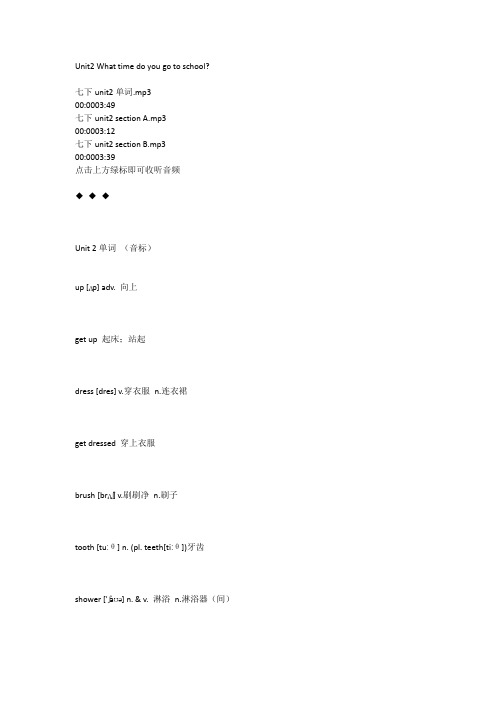
Unit2 What time do you go to school?七下unit2单词.mp300:0003:49七下unit2 section A.mp300:0003:12七下unit2 section B.mp300:0003:39点击上方绿标即可收听音频◆◆◆Unit 2单词(音标)up [ʌp] adv. 向上get up 起床;站起dress [dres] v.穿衣服n.连衣裙get dressed 穿上衣服brush [brʌʃ] v.刷刷净n.刷子tooth [tuːθ] n. (pl. teeth[tiːθ])牙齿shower ['ʃaʊə] n. & v. 淋浴n.淋浴器(间)take a shower 洗淋浴usually ['ju:ʒuəli] adv.通常地;一般地forty ['fɔ:(r)ti] num.四十wow [waʊ] interj.(表示惊奇或敬佩)哇;呀never ['nevə(r)] adv.从不;绝不early ['ɜːlɪ] adv. & adj.早(的)fifty ['fɪftɪ] num.五十job [dʒɒb], [dʒɑːb] n.工作;职业work [wɜːk] v. & n. 工作station ['steɪʃn] n.电(视)台;车站radio station 广播电台o'clock [ə'klɒk], [ə'klɑ:k] adv.(表示整点)……点钟night [naɪt] n. 晚上;夜晚funny ['fʌnɪ] adj.奇怪的;滑稽好笑的exercise ['eksəsaɪz] v. & n. 锻炼;练习on weekends (在)周末best [best] adj.最好的adv.最好地;最group [gruːp] n.组;群half [hɑːf], [hæf] n. & pron. 一半;半数past [pɑːst],[pæst] prep.晚于;过(时间)adj.过去的quarter ['kwɔː(r)tə(r)] n.一刻钟;四分之一homework['həʊmwɜː(r)k] n. 家庭作业do (one’s) homework 做作业run [rʌn] v. 跑;奔clean [kliːn] v.打扫;弄干净adj.干净的walk [wɔːk] n. & v. 行走;步行take a walk 散步;走一走quickly ['kwɪkli] adv. 很快地either ['aɪðə(r)], [ 'iːðə(r) ]adv.或者;也(用在否定词组后)either…or…要么……要么……;或者……或者……lot [lɒt], [lɑ:t] pron.大量;许多lots of 大量;许多sometimes ['sʌmtaɪmz] adv.有时taste [teɪst] v.有……的味道;品尝n.味道;滋味life [laɪf] n.生活;生命Rick [rɪk] 里克(男名)Jim [dʒɪm] 吉姆(男名)Scott [skɒt], [skɑ:t] 斯科特(男名)Tony ['təʊnɪ] 托尼(男名)unit2电子课本Unit2 知识梳理◆短语归纳1. what time 几点2. go to school 去上学3. get up 起床4. take a shower 洗淋浴5. brush teeth 刷牙6. get to 到达7. do homework 做家庭作业8. go to work 去上班9. go home 回家10. eat breakfast 吃早饭11. get dressed 穿上衣服12. get home 到家13. either…or…要么…要么…14. go to bed 上床睡觉15. in the morning/afternoon/evening 在上午/下午/晚上16. take a walk 散步17. lots of=a lot of 许多,大量18. radio station 广播电台19. at night 在晚上20. be late for=arrive late for 迟到◆用法集萃1. at + 具体时间点在几点(几分)2. eat breakfast/lunch/dinner 吃早饭/午饭/晚饭3. thirty/half past +基数词…点半4. fifteen/a quarter to +基数词差一刻到…点5. take a/an+名词从事…活动6. from…to…从…到…7. need to do sth 需要做某事◆典句必背1. —What time do you usually get up? 你通常几点钟起床?—I usually get up at six thirty. 我通常6:30起床。
Unit2Whattimedoyougotoschool复习资料人教版七年级英语下册
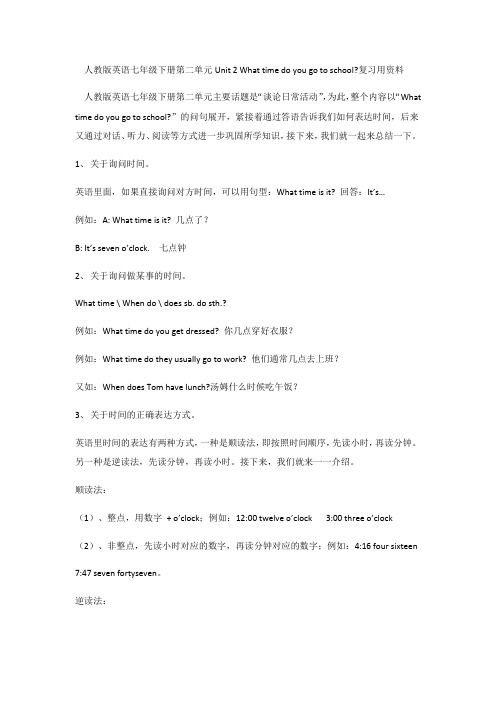
人教版英语七年级下册第二单元Unit 2 What time do you go to school?复习用资料人教版英语七年级下册第二单元主要话题是“谈论日常活动”,为此,整个内容以“What time do you go to school?”的问句展开,紧接着通过答语告诉我们如何表达时间,后来又通过对话、听力、阅读等方式进一步巩固所学知识,接下来,我们就一起来总结一下。
1、关于询问时间。
英语里面,如果直接询问对方时间,可以用句型:What time is it? 回答:It’s…例如:A: What time is it? 几点了?B: It’s seven o’clock. 七点钟2、关于询问做某事的时间。
What time \ When do \ does sb. do sth.?例如:What time do you get dressed? 你几点穿好衣服?例如:What time do they usually go to work? 他们通常几点去上班?又如:When does Tom have lunch?汤姆什么时候吃午饭?3、关于时间的正确表达方式。
英语里时间的表达有两种方式,一种是顺读法,即按照时间顺序,先读小时,再读分钟。
另一种是逆读法,先读分钟,再读小时。
接下来,我们就来一一介绍。
顺读法:(1)、整点,用数字+ o’clock;例如:12:00 twelve o’clock 3:00 three o’clock (2)、非整点,先读小时对应的数字,再读分钟对应的数字;例如:4:16 four sixteen 7:47 seven fortyseven。
逆读法:(1)、当分钟数小于30时,用“分钟对应的数字+ past + 小时对应的数字”,例如:8:12 twelve past eight 9:28 twentyeight past nine 10:08 eight past ten特殊情况:当分钟数等于15时,15可以用英语单词“a quarter来表示”,例如:6:15 a quarter past six;又如:9:30half past nine。
人教版新目标版七年级英语下册 Unit 2 What time do you go to school Section A教案2
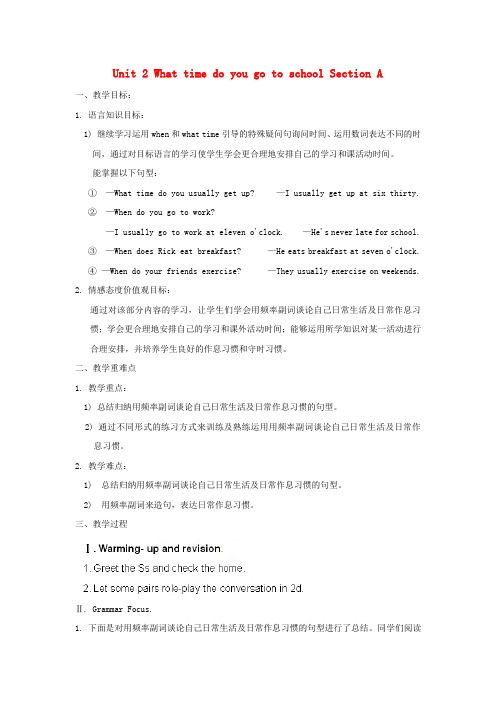
Unit 2 What time do you go to school Section A一、教学目标:1. 语言知识目标:1) 继续学习运用when和what time引导的特殊疑问句询问时间、运用数词表达不同的时间,通过对目标语言的学习使学生学会更合理地安排自己的学习和课活动时间。
能掌握以下句型:①—What time do you usually get up? —I usually get up at six thirty.②—When do you go to work?—I usually go to work at eleven o'clock. —He's never late for school.③—When does Rick eat breakfast? —He eats breakfast at seven o'clock.④—When do your friends exercise? —They usually exercise on weekends.2. 情感态度价值观目标:通过对该部分内容的学习,让学生们学会用频率副词谈论自己日常生活及日常作息习惯;学会更合理地安排自己的学习和课外活动时间;能够运用所学知识对某一活动进行合理安排,并培养学生良好的作息习惯和守时习惯。
二、教学重难点1. 教学重点:1) 总结归纳用频率副词谈论自己日常生活及日常作息习惯的句型。
2) 通过不同形式的练习方式来训练及熟练运用用频率副词谈论自己日常生活及日常作息习惯。
2. 教学难点:1) 总结归纳用频率副词谈论自己日常生活及日常作息习惯的句型。
2) 用频率副词来造句,表达日常作息习惯。
三、教学过程Ⅱ. Grammar Focus.1. 下面是对用频率副词谈论自己日常生活及日常作息习惯的句型进行了总结。
同学们阅读Grammar Focus中的句子,然后做填空练习。
- 1、下载文档前请自行甄别文档内容的完整性,平台不提供额外的编辑、内容补充、找答案等附加服务。
- 2、"仅部分预览"的文档,不可在线预览部分如存在完整性等问题,可反馈申请退款(可完整预览的文档不适用该条件!)。
- 3、如文档侵犯您的权益,请联系客服反馈,我们会尽快为您处理(人工客服工作时间:9:00-18:30)。
What time is it? =What’s the time?
11 12 1
10 9
.
2 3
8
4
76 5
It’s esenltotfseihwfiwoeginvrxunehoeerltevneo’clock.
Homework :
2b
Name Bob Mary Jerry Rick Alicia
Time
5:00 6:00 7:00 8:00 9:00
Interviewer: You have a big family, don’t you, Rick? Rick: Yes, I have two brothers and two sisters. Interviewer: Wow! How many showers do you have? Rick: We only have one shower. Interviewer: Is that difficult? Rick: No, because we have a shower schedule.时间表 My brother Bob takes a shower first, at five o’clock. Interviewer: Wow, that’s early! Rick: Yeah. Then my sister Mary takes a shower at six o’clock. Next my brother Jerry takes a shower at eight o’clock, my sister Alicia at nine o’clock.
go to bed
1a
Match the words and
the pictures.
1. go to school __a__
2. get up ___d__
3. run __b___
4. eat breakfast __e_
5. take a shower__c_
1b
Listen and match the times with actions.
It’s about nine thirty It’s about twelve fifteen. pmin the evening.
get up
What time do you usually get up? I usually get up at … in the morning.
brush your teeth
go to school
What time do you usually go to school? I usually go to school at ….
eat lunch
go home
eat dinner
do one’s homework watch TV
take a shower have a shower
It’s three thirty-five.
It’s two fifty.
It’s three forty.
It’s ten ten.
It’s about/around nine fifteen. 大约 It’s nine sixteen.
It’s about four forty.
It’s about nine twenty.
What time do you usually brush your teeth? I usually brush teeth at … in the morning.
eat breakfast have breakfast
What time do you usually eat breakfast? I usually eat breakfast at ….
